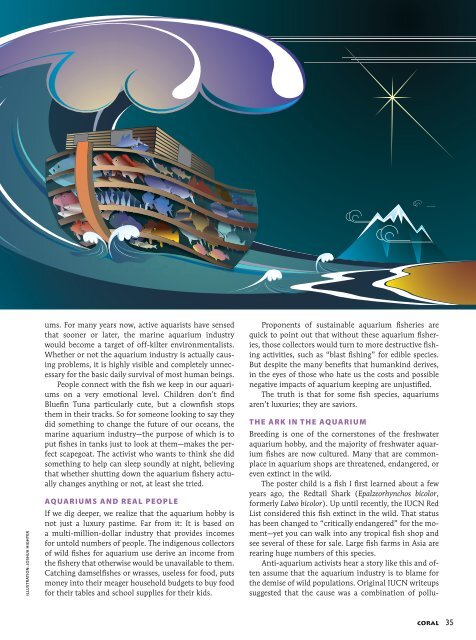Create successful ePaper yourself
Turn your PDF publications into a flip-book with our unique Google optimized e-Paper software.
ILLUSTRATION: JOSHUA HIGHTER<br />
ums. For many years now, active aquarists have sensed<br />
that sooner or later, the marine aquarium industry<br />
would become a target of off-kilter environmentalists.<br />
Whether or not the aquarium industry is actually causing<br />
problems, it is highly visible and completely unnecessary<br />
for the basic daily survival of most human beings.<br />
People connect with the fish we keep in our aquariums<br />
on a very emotional level. Children don’t find<br />
Bluefin Tuna particularly cute, but a clownfish stops<br />
them in their tracks. So for someone looking to say they<br />
did something to change the future of our oceans, the<br />
marine aquarium industry—the purpose of which is to<br />
put fishes in tanks just to look at them—makes the perfect<br />
scapegoat. The activist who wants to think she did<br />
something to help can sleep soundly at night, believing<br />
that whether shutting down the aquarium fishery actually<br />
changes anything or not, at least she tried.<br />
AQUARIUMS AND REAL PEOPLE<br />
If we dig deeper, we realize that the aquarium hobby is<br />
not just a luxury pastime. Far from it: It is based on<br />
a multi-million-dollar industry that provides incomes<br />
for untold numbers of people. The indigenous collectors<br />
of wild fishes for aquarium use derive an income from<br />
the fishery that otherwise would be unavailable to them.<br />
Catching damselfishes or wrasses, useless for food, puts<br />
money into their meager household budgets to buy food<br />
for their tables and school supplies for their kids.<br />
Proponents of sustainable aquarium fisheries are<br />
quick to point out that without these aquarium fisheries,<br />
those collectors would turn to more destructive fishing<br />
activities, such as “blast fishing” for edible species.<br />
But despite the many benefits that humankind derives,<br />
in the eyes of those who hate us the costs and possible<br />
negative impacts of aquarium keeping are unjustified.<br />
The truth is that for some fish species, aquariums<br />
aren’t luxuries; they are saviors.<br />
THE ARK IN THE AQUARIUM<br />
Breeding is one of the cornerstones of the freshwater<br />
aquarium hobby, and the majority of freshwater aquarium<br />
fishes are now cultured. Many that are commonplace<br />
in aquarium shops are threatened, endangered, or<br />
even extinct in the wild.<br />
The poster child is a fish I first learned about a few<br />
years ago, the Redtail Shark (Epalzeorhynchos bicolor,<br />
formerly Labeo bicolor). Up until recently, the IUCN Red<br />
List considered this fish extinct in the wild. That status<br />
has been changed to “critically endangered” for the moment—yet<br />
you can walk into any tropical fish shop and<br />
see several of these for sale. Large fish farms in Asia are<br />
rearing huge numbers of this species.<br />
Anti-aquarium activists hear a story like this and often<br />
assume that the aquarium industry is to blame for<br />
the demise of wild populations. Original IUCN writeups<br />
suggested that the cause was a combination of pollu-<br />
CORAL<br />
35

















